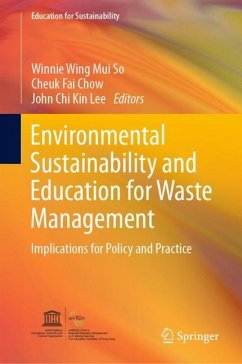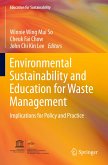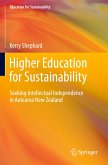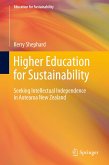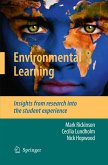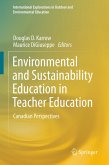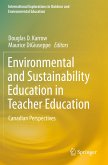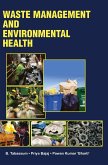Environmental Sustainability and Education for Waste Management
Implications for Policy and Practice
Herausgegeben:So, Winnie Wing Mui; Chow, Cheuk Fai; Lee, John Chi Kin
Environmental Sustainability and Education for Waste Management
Implications for Policy and Practice
Herausgegeben:So, Winnie Wing Mui; Chow, Cheuk Fai; Lee, John Chi Kin
- Gebundenes Buch
- Merkliste
- Auf die Merkliste
- Bewerten Bewerten
- Teilen
- Produkt teilen
- Produkterinnerung
- Produkterinnerung
This book focuses on education for environmental sustainability, in particular the area of solid waste management. Presenting the latest studies from different countries, industries and education sectors on the approaches and innovative ideas to educate future citizens regarding sustainable development of our planet, it is of interest to educators, academics, tertiary students, policy-makers, environmental scientists, social scientists and practitioners who have been involved in education, policy, science, and technological innovation for solid waste management.
Andere Kunden interessierten sich auch für
![Environmental Sustainability and Education for Waste Management Environmental Sustainability and Education for Waste Management]() Environmental Sustainability and Education for Waste Management77,99 €
Environmental Sustainability and Education for Waste Management77,99 €![Higher Education for Sustainability Higher Education for Sustainability]() Kerry ShephardHigher Education for Sustainability39,99 €
Kerry ShephardHigher Education for Sustainability39,99 €![Higher Education for Sustainability Higher Education for Sustainability]() Kerry ShephardHigher Education for Sustainability39,99 €
Kerry ShephardHigher Education for Sustainability39,99 €![Environmental Learning Environmental Learning]() Mark RickinsonEnvironmental Learning77,99 €
Mark RickinsonEnvironmental Learning77,99 €![Environmental and Sustainability Education in Teacher Education Environmental and Sustainability Education in Teacher Education]() Environmental and Sustainability Education in Teacher Education131,99 €
Environmental and Sustainability Education in Teacher Education131,99 €![Environmental and Sustainability Education in Teacher Education Environmental and Sustainability Education in Teacher Education]() Environmental and Sustainability Education in Teacher Education131,99 €
Environmental and Sustainability Education in Teacher Education131,99 €![WASTE MANAGEMENT AND ENVIRONMENTAL HEALTH WASTE MANAGEMENT AND ENVIRONMENTAL HEALTH]() B. TabassumWASTE MANAGEMENT AND ENVIRONMENTAL HEALTH41,99 €
B. TabassumWASTE MANAGEMENT AND ENVIRONMENTAL HEALTH41,99 €-
-
-
This book focuses on education for environmental sustainability, in particular the area of solid waste management. Presenting the latest studies from different countries, industries and education sectors on the approaches and innovative ideas to educate future citizens regarding sustainable development of our planet, it is of interest to educators, academics, tertiary students, policy-makers, environmental scientists, social scientists and practitioners who have been involved in education, policy, science, and technological innovation for solid waste management.
Produktdetails
- Produktdetails
- Education for Sustainability
- Verlag: Springer Nature Singapore / Springer, Berlin
- Artikelnr. des Verlages: 978-981-13-9172-9
- 1st edition 2019
- Seitenzahl: 336
- Erscheinungstermin: 7. August 2019
- Englisch
- Abmessung: 241mm x 160mm x 24mm
- Gewicht: 618g
- ISBN-13: 9789811391729
- ISBN-10: 9811391726
- Artikelnr.: 56820462
- Herstellerkennzeichnung Die Herstellerinformationen sind derzeit nicht verfügbar.
- Education for Sustainability
- Verlag: Springer Nature Singapore / Springer, Berlin
- Artikelnr. des Verlages: 978-981-13-9172-9
- 1st edition 2019
- Seitenzahl: 336
- Erscheinungstermin: 7. August 2019
- Englisch
- Abmessung: 241mm x 160mm x 24mm
- Gewicht: 618g
- ISBN-13: 9789811391729
- ISBN-10: 9811391726
- Artikelnr.: 56820462
- Herstellerkennzeichnung Die Herstellerinformationen sind derzeit nicht verfügbar.
Winnie Wing Mui So is a Professor at the Department of Science and Environmental Studies at the Education University of Hong Kong, the Director of the Centre for Education in Environmental Sustainability and the Associate Dean of the Graduate School. Her main research areas are STEM education, science and environmental education, and she has published more over 100 journal articles, books, book chapters, reports and patents. She was the President of the Asia-Pacific Education Research Association, and is an executive member of the World Education Research Association, and Hong Kong Educational Research Association. Cheuk Fai Chow (PhD) is an Associate Professor at the Department of Science and Environmental Studies and the Director of Knowledge Transfer at the Education University of Hong Kong. He received a Croucher fellowship and completed his postdoctoral training with Nobel laureate Jean Marie Lehn. His research focuses on applying his chemistry background to energy, waterresource and plastic waste studies. He has published over 80 journal articles, book chapters, and patents, and he is a member of the HKSAR Environmental and Conservation Fund Waste Reduction and the honorable adviser to the Hong Kong Recycling Chamber of Commerce. John Chi Kin Lee is Vice President (Academic) and Chair Professor of Curriculum and Instruction at the Education University of Hong Kong (EdUHK). He is also the Director, Centre for Religious and Spirituality Education; Co-Director (Research), Centre for Excellence in Learning and Teaching; and Co-Director, Centre for Education in Environmental Sustainability. He was appointed as the UNESCO Chair in Regional Education Development and Lifelong Learning at the EdUHK, as well as the Changjiang Chair Professor by the Ministry of Education, China. He served as the regional editor (Asia-Pacific) of Educational Research and Evaluation, and executive editor of Teachers and Teaching.
1 Environmental sustainability and education for waste.- Part 1 Policy and Social Responsibility for Waste Management.- 2 E-waste management: Challenge and opportunity.- 3 Solid waste management in Malaysia: The perspectives of non-governmental organizations (NGOs) and youths on consumers' commitment.- 4 The circular economy of plastics in the Netherlands.- 5 Mismanaged plastic waste: Far side of the moon.- 6 Hong Kong needs to embrace a holistic approach to waste management.- Part 2 Environmental Programmes for Schools and Universities, as well as Community Education for Waste Management.- 7 Community and school education on the subject of waste management: Experiences of Romania, the United Kingdom and Germany.- 8 Waste management education: Chinese perspective and experiences.- 9 Waste management and recycling education in Taiwan.- 10 Enhancing pupils' pro-environmental knowledge, attitudes and behaviors on plastic recycling education: A quasi-experimental study in primary schools.-11 Solid waste management in tourist destinations in developing nations: Case studies in Hoi An, Vietnam and Puncak, Indonesia.- 12 A critical cartography of waste education in Australia: Turning to a posthumanist framing.- Part 3 New Science and Technologies for Waste Treatment.- 13 A study on Fenton Technology for Polypropylene Waste Degradation and recovery of high-value chemicals.- 14 Carbon dioxide biosequestration and wastewater treatment using microalgae.- 15 Utilizing different forms of waste sludge in eco-construction material production.- 16 Evaluation of nutritional values of food waste-based feed pellets and common feeding materials for culturing freshwater fish.
1 Environmental sustainability and education for waste.- Part 1 Policy and Social Responsibility for Waste Management.- 2 E-waste management: Challenge and opportunity.- 3 Solid waste management in Malaysia: The perspectives of non-governmental organizations (NGOs) and youths on consumers' commitment.- 4 The circular economy of plastics in the Netherlands.- 5 Mismanaged plastic waste: Far side of the moon.- 6 Hong Kong needs to embrace a holistic approach to waste management.- Part 2 Environmental Programmes for Schools and Universities, as well as Community Education for Waste Management.- 7 Community and school education on the subject of waste management: Experiences of Romania, the United Kingdom and Germany.- 8 Waste management education: Chinese perspective and experiences.- 9 Waste management and recycling education in Taiwan.- 10 Enhancing pupils' pro-environmental knowledge, attitudes and behaviors on plastic recycling education: A quasi-experimental study in primary schools.-11 Solid waste management in tourist destinations in developing nations: Case studies in Hoi An, Vietnam and Puncak, Indonesia.- 12 A critical cartography of waste education in Australia: Turning to a posthumanist framing.- Part 3 New Science and Technologies for Waste Treatment.- 13 A study on Fenton Technology for Polypropylene Waste Degradation and recovery of high-value chemicals.- 14 Carbon dioxide biosequestration and wastewater treatment using microalgae.- 15 Utilizing different forms of waste sludge in eco-construction material production.- 16 Evaluation of nutritional values of food waste-based feed pellets and common feeding materials for culturing freshwater fish.

